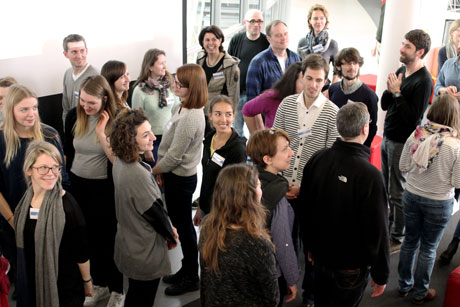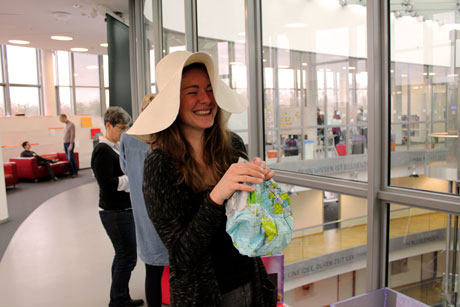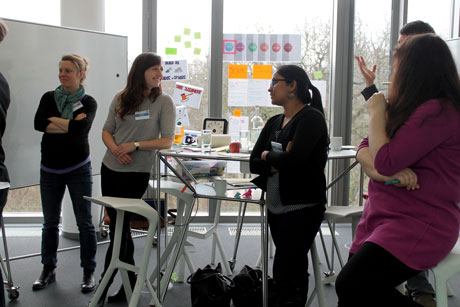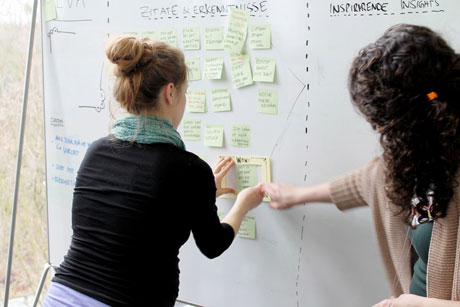HPI campus, March 23rd 8.30 AM – so far a quite ordinary Wednesday morning at the HPI campus. Slowly but surely the third floor of the main building fills up with today’s participants of the third pro bono NGO workshop hold at HPI Academy. Thirty guests from the social and fundraising sector are taking part in a one-day-workshop on the principles of design thinking. While the arriving guests stow their jackets and suitcases, twelve motivated design thinking coaches – all recent d.school graduates – prepare the team spaces for the upcoming team sessions with all kind of design thinking paraphernalia like post-its, colored pens etc.
At 9:15 on the dot, the colorful mix of people with diverse backgrounds within the social sector – from highly innovative social start-ups up to established NGOs – gather in the presentation corner for a short welcome intro held by lead coach Samuel. Before jumping into the topic of the day, Samuel gives a brief introduction of HPI and design thinking at HPI.
“One single day to go through the whole design thinking process is ambitious but feasible,” says Felix, who leads today’s workshop with Samuel. “Design thinking is not only a sequence of methods,” Samuel says just after that. He explains that participants should instead try to engage with the principles of design thinking and use them as flexible tools. And this is how we proceed. The team is ready to start the first warm-up of the day, a modified form of Bingo, where we find out that none of the participants or coaches hold a patent, and that there are three Facebook-abstainers and a number of hobby gardeners in the group.
After this energy raising intro, Felix introduces the design challenge of the day: “Design a solution for busy professional that tackles the problem of food waste.” This is an important topic for Sascha, who works at the Forschungsinstitut Betriebliche Bildung: “The topic of the challenge affects many areas of life, from private eating habits and general overconsumption to mass overproduction.” UI- and UX designer Lisa, who works for an educational institution in the area of social entrepreneurship goes “dumpster diving” on a regular basis with friends. We distribute all the food we are not able to eat ourselves. “I try not to throw any food away.”
With their very personal views, perspectives and stories on the topic of food waste the teams start their design work. In order to manage this short but effective design thinking introduction the rest of the day is carefully timed and well organized. It seems like the numerous Time Timers are buzzing every few minutes. The atmosphere is full of energy, fun and innovative ideas.
The concept of this one-day-workshop is focused on experience. Theoretical inputs are kept to a minimum in order to let the participants dive into the experience. The ambitious goal for the day is that the team experience every one of the six design thinking phases. While Team one is performing a “brainstorming polonaise,” team six takes over the elevator for a spontaneous “lift-storming session” with coach and Time Timer.
The final presentations of the day show that the effort was worth it. The participants come up with six innovative prototypes, addressing different topics of the food waste problem. Beside a delivery service application for biological, fair trade and regional food, and a “re-cooking”-concept for restaurants, a smart fridge called “Fred” was also created. Fred puts nearly expired food products online into a recycling-cloud-community and also has also an integrated “leftover recipe service”.
With a lot of creative ideas to confront the problem of food waste, combined with new perspectives, contacts and fun, the participants leave the HPI campus after an intensive introduction to design thinking. The design thinking coaches are also happy at the end of the workshop day. Besides providing new coaching experiences, the work with the NGO representatives showed again that the social sector is full of starting points for design thinking challenges and processes, which can be realized in specific projects, thereby moving the overall social significance of design thinking more fully to the forefront.




